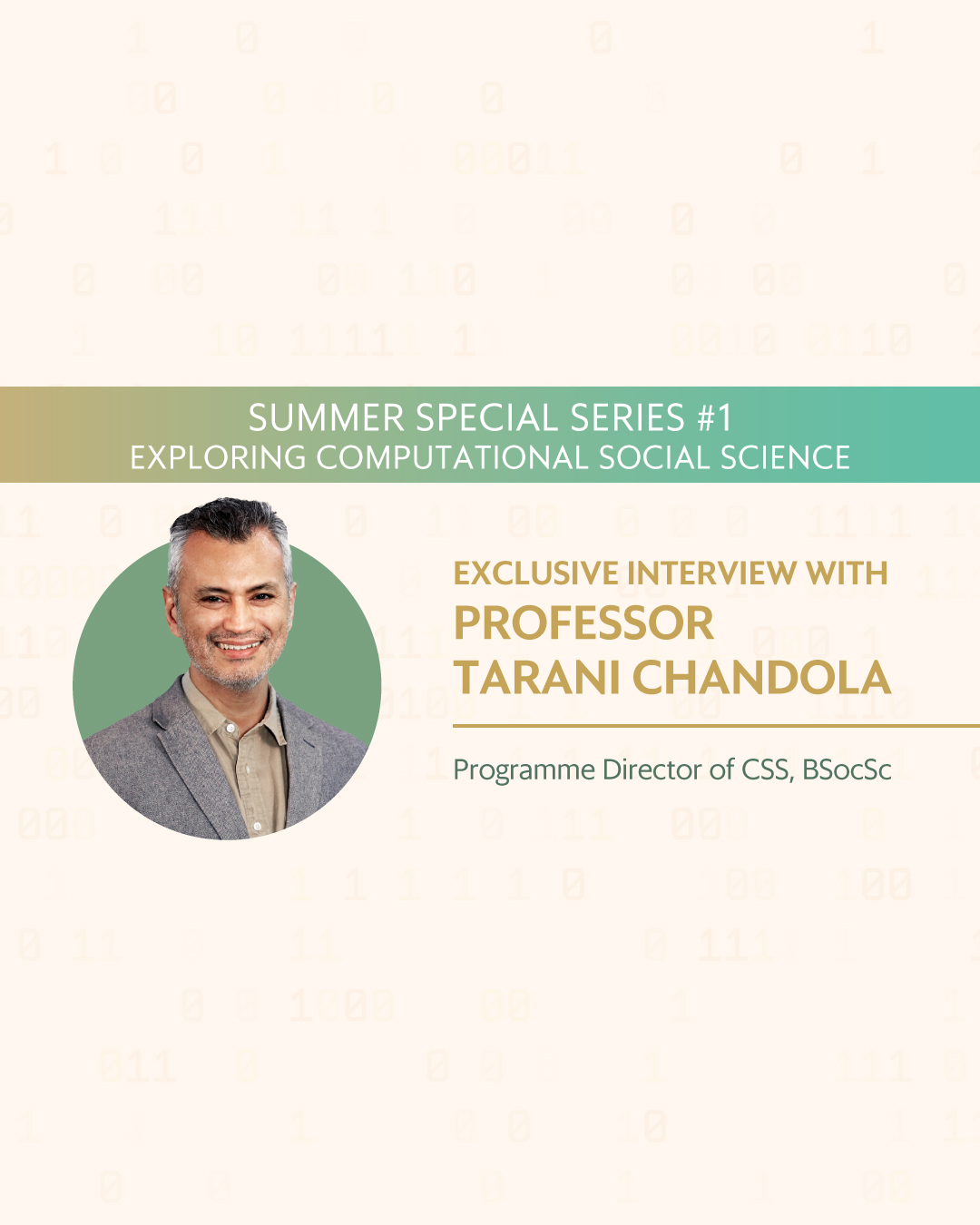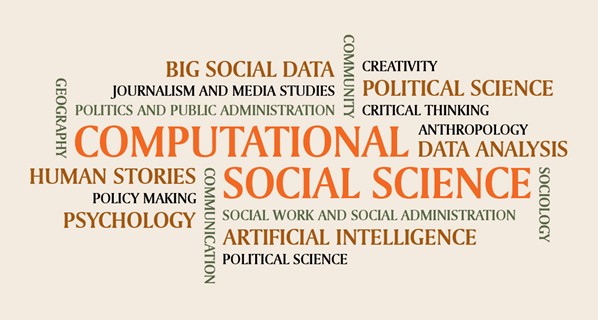Exploring the Human Stories Behind Big Data: New Computational Social Science Major Bridges Social Sciences and Data Analysis

With the Faculty of Social Sciences launching a new major in Computational Social Science (CSS) as part of the Bachelor of Social Sciences programme, Programme Director Professor Tarani Chandala offers insights into how this major bridges social sciences and data analysis, emphasising the human stories behind the numbers. He explains that prospective students can look forward to a human-centric course – and why they shouldn’t be afraid of the numbers.
This inaugural chapter sets the stage for our summer series, where Chapters 2 and 3 delve into how CSS intersects with various disciplines, including Geography, Politics and Public Administration, Psychology, Social Work and Social Administration, Sociology, and Journalism and Media Studies. Join us as we uncover the foundational elements of CSS and its potential to reshape the way we engage with social sciences, empowering students to become social innovators ready to tackle global challenges.

Computational Social Science (CSS) is a new major available from September as part of the Bachelor of Social Sciences, the flagship programme of the Faculty of Social Sciences. CSS is an interdisciplinary field that examines society and human behaviour using computational methods, tools and models. It integrates elements of computer science and statistics with social science disciplines such as sociology, psychology, economics, political science and anthropology.
“CSS is quite a new discipline, so many people may not be familiar with it,” says Professor Chandala. “It’s primarily coming from the development of new methods and techniques for analysing big social data. That’s the new revolution in the social sciences, the large amounts of data we now have access to.”
In the social sciences context, big data is deeply connected to the human details of how people live.
“It’s things like tax records, administrative records, government records, people’s hospital records or social security records,” explains Professor Chandala. “’If you think about everybody in a country – their data collected over their lifetime – that’s a lot of data. It’s not easy to analyse such large amounts of data. So we need the modern computing methods to analyse these data.”
While data and computer scientists are experts in analysing numerical data, social scientists have the key skills of understanding how the data are produced and the human stories behind the numbers.

“So we really need people who are trained both in the social sciences as well as in the data science techniques,” says Professor Chandala. “That’s what computational social sciences is: it’s about training and doing research and analysis in big social data using people who are trained in social sciences as well as in these new computational methods.”
Computational Social Science in Use
One example of how CSS can enable deep exploration of society is through examining tax records. Researchers can now access the tax records of people in an entire country, enabling a much deeper dive into the data compared to the previous limitations of individual surveys.
Assessed on a broad scale, tax records can show how people’s incomes change over time, by how much and where, enabling social scientists to pinpoint areas where social mobility has been hampered and allowing them to focus their attention on why that has happened.
“Big social data enables us to see the big macro social picture as well as to delve into the smaller micro social detail, and see to what extent individuals differ from that big picture,” Professor Chandala explains.
Computational Social Science, Artificial Intelligence and Data Analysis
The advent of big data and the almost concurrent development of artificial intelligence (AI) has led to some overlap – and occasionally, confusion – between the two fields.
“I think of AI as the tool that we use, and CSS as the set of instructions on how to use that tool,” he says. “So definitely, the CSS toolkit includes AI technologies, but it’s not just AI technologies.”
The human element is crucial, he stresses. CSS provides an intention behind the use of the AI. It’s about how the data is going to be used and how the results are informed.
“Computational thinking is not thinking like a computer – we’ve got computers to do that – but developing the skills on how to use computational tools to solve problems,” he says. “That’s very much at the heart of CSS: to use these new tools to solve, answer social questions.”
He sees computational thinking as a valuable addition to the four Cs of critical thinking, creativity, collaboration, and communication that often personify social scientists.
“We want to add computational thinking to these for the broad general learning outcomes, and that’s what I think will really help equip the students in their career path,” he adds.
Path from Social Sciences Research Centre, Methods Hub to Computational Social Science
The CSS major was gradually developed by the Faculty’s Social Sciences Research Centre (SSRC), which has a long history in research expertise and whose scope has expanded in recent years to include computational data collection and analysis and AI. The SSRC includes the Methods Hub for Research, Policy and Practice (Methods Hub), which has been upskilling both students and faculty in new computational and quantitative methods. Over the past five years, the Faculty has increasingly focused on hiring leading experts in these areas. The confluence of these developments offers undergraduates the timely opportunity to benefit from expertly led courses that blend individual social science disciplines with computer science and AI skills.

“So what we now have are social scientists within psychology, journalism, politics, sociology, geography, social work, trained in the use of these new CSS methods and also developing new methods of their own within the social sciences,” explains Professor Chandala, who is also Director of the SSRC and the Methods Hub.
“What I think makes the HKU offering unique is that students will be trained within specific social science disciplines – so within geography, within sociology, within psychology, journalism, social work,” he says. “So they’re getting the full social science, disciplinary backgrounds as well as the training in the new methods of analysing big social data.”
For potential CSS students who fear an overload of number-crunching, he has reassuring advice to offer.
“We’re definitely not producing computer science or data science graduates. And we’re definitely emphasising the importance of having a social science understanding as well as having the skills to analyse these big social data. The way we’ve designed this major programme is that students can choose both: they can have a major in CSS as well as another major or another concentration in one of our social science disciplines.”
“I think, traditionally, some students have been slightly hesitant in doing CSS because they think it’s a lot of maths, and they don’t have the maths. But really what we’re trying to emphasise here is being able to use these tools to meaningfully analyse the data. So it’s really very much the application of the tools and the interpretation of the data that we very much emphasise rather than the math side of things.”
Contributing writer: Liana Cafolla
#2 From Theory to Practice: The Launch of Computational Social Science
#3 Unveiling New Dimensions with Computational Social Science